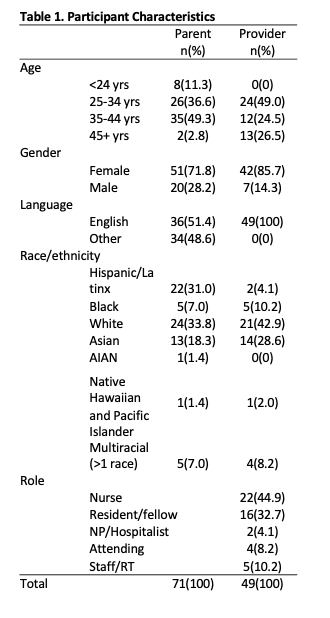Neonatal-Perinatal Health Care Delivery: Epidemiology/Health Services Research
Neonatal-Perinatal Health Care Delivery 1: Epi/HSR Equity
620 - Parent and provider perceptions of racism in a single-center neonatal intensive care unit
Publication Number: 620.14

Kayla L. Karvonen, MD (she/her/hers)
Neonatal-Perinatal Fellow
UCSF
San Francisco, California, United States
Presenting Author(s)
Background: Neonatal Intensive Care Unit (NICU) parents and providers have described experiences of racism during hospitalization.
Objective: We sought to quantify and compare perceptions of racism in a single tertiary care center.
Design/Methods:
Family and provider demographics and the Everyday Discrimination Scale (EDS) adapted for medical settings (a 7 item, 5 point likert scale), were collected in the 2021-2022 Racial and Ethnic Justice in Neonatal Intensive Care (REJOICE) study via electronic survey. Descriptive statistics, Kruskal-Wallis tests, and unadjusted ordered logistic regressions were performed.
Results: 71 parents and 49 providers participated (Table 1). Most parents reported never or rarely experiencing racism in the NICU (all median item scores 1). Providers more often witnessed families experiencing racism than families reported (median item scores 2-3, median total score [MTS] 20 vs. MTS 7 p< 0.001). Providers rarely to sometimes experienced racism, more frequently than families reported (MTS 13 vs. MTS 7 p< 0.001, Figure 1). There were no differences in MTS by age, gender, language, or provider role. Black parents experienced and Black providers witnessed and experienced more racism their white counterparts (Black parents: OR 6.7 95%CI 1.0-43.5 p=0.046, Black providers: OR 7.3 95%CI 1.2-46.0 p=0.034, OR 41.1 95%CI 6.1-278.8 p< 0.001, Table 2).
Conclusion(s): NICU providers reported witnessing and experiencing racism more often than parents. Differences in provider and parent perceptions of racism is likely influenced by experiences, roles, identities, and psychological safety.
.png)
.png)
